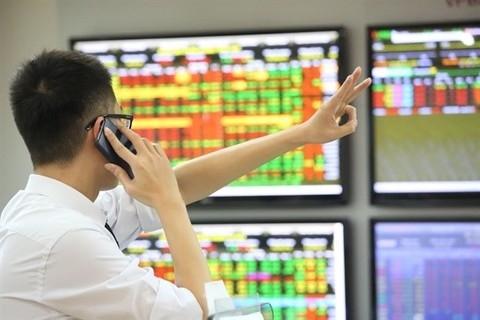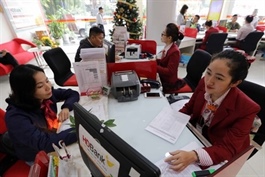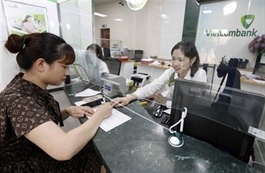Stock market benefits from supportive policies and foreign capital inflow
Stock market benefits from supportive policies and foreign capital inflow
The stock market had a positive trading week, boosted by optimistic investor sentiment.

A trader monitors the stock market. — Photo baotintuc.vn |
Following a slight adjustment earlier in the week, the market rebounded with strong gains over the next three consecutive sessions, pushing the VN-Index closer to the 1,300-point level.
Additionally, robust capital inflow into the market reflected investor optimism driven by several favourable macroeconomic factors.
On the Hồ Chí Minh Stock Exchange (HoSE), the VN-Index closed the week at 1,290.92 points, while on the Hà Nội Stock Exchange (HNX), the HNX-Index ended at 235.71 points.
Both indices experienced weekly gains, with the VN-Index rising by 1.48 per cent and the HNX-Index increasing by 0.6 per cent.
Market liquidity also improved as investor sentiment turned more positive. The total average trading value per session for the week reached VNĐ21.498 trillion, a 19.3 per cent increase from the previous week. Notably, trading volume surged across all three exchanges, with some sessions surpassing the billion-dollar mark.
Foreign investors were more active during the week, increasing their trading volume. Although they sold a net total of VNĐ499 billion, this was primarily due to a significant one-off sale of VIB shares (-VNĐ2.7 trillion). Excluding this transaction, foreign investors showed a strong net buying trend throughout the week.
Phan Tấn Nhật, Head of Analysis at Saigon-Hanoi Securities (SHS), commented that the stock market received various positive macroeconomic news during the week, serving as an "inspiration" for the capital inflow into the market.
Noteworthy developments included General Secretary and President Tô Lâm meeting with leading US businesses, the State Bank of Việt Nam significantly increasing the scale of open market operations (OMO) to support liquidity in the banking system, and the People’s Bank of China (PBoC) announcing a 0.5 percentage point cut in the reserve requirement ratio, a reduction in key policy rates, and an injection of approximately RMB1 trillion (US$141.7 billion) in long-term liquidity into the financial markets.
Regarding the outlook for the coming week, Nhật said that after surpassing the highest levels of 2023 with substantial macroeconomic support, the VN-Index continued to show a relatively positive upward trend.
However, the VN-Index is facing strong resistance around the 1,300-point mark, which has been a peak for several months. Meanwhile, the VN30-Index rose over 2 per cent, closing at 1,352.57 points, breaking through the highest level of June at 1,340 points, but now facing significant resistance between 1,360-1,370 points, marking the connection to the highest price levels of 2023 and 2024.
In the short term, Nhật forecast that the VN-Index would continue its growth trajectory with the nearest support around 1,280 points, aiming for the resistance zone representing the highest price levels since the beginning of 2024, as well as the peak of August 2022.
At this psychological resistance level of 1,300 points, the market is exhibiting significant divergence, making it an unsuitable level for disbursement and offering no certainty of a further breakout.
Nhật said: “The market will conclude Q3 and commence Q4 amidst the release of business results. Therefore, investors should maintain a balanced portfolio and consider expanding or adding to their holdings, focusing on stocks that have not yet seen much recovery and are priced similarly to when the VN-Index was at 1,250 points.”
The analysis team at VCBS suggested that the market trading strategy remains in a stable phase without clear signals. Specifically, the Vietnamese stock market is on an upward trend, supported by multiple positive factors. However, investors should remain cautious, plan their investments wisely, and closely monitor market developments and influencing factors to make effective investment decisions.

























